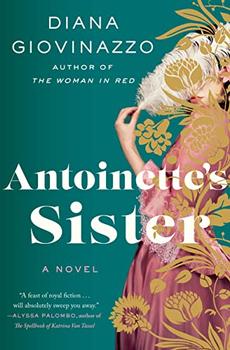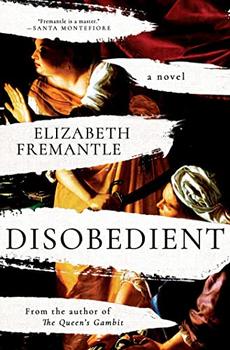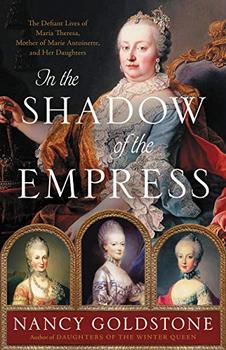Summary | Excerpt | Reading Guide | Reviews | Beyond the book | Read-Alikes | Genres & Themes | Author Bio

"You don't just lose a sibling; you lose a shared sense of history."
Such are the thoughts of Maria Carolina of Austria, Queen of Naples and Sicily, as she reflects on the death of her beloved younger sister, Marie Antoinette, in Diana Giovinazzo's Antoinette's Sister. Even though she has achieved vast successes by introducing science, culture and refinement to her husband's Spanish-Italian court, Maria Carolina — known as Charlotte to her family and friends — has failed in her goal to rescue Antoinette from the guillotine.
Even though many people who pick up this book will know the ending of Marie Antoinette's life, fewer will know the details of Charlotte's. This intelligent queen was part of one of Europe's most powerful families; her mother, Maria Theresa, was the only female ruler of the Holy Roman Empire. Charlotte certainly follows in her mother's footsteps as she gains control of the kingdom of Naples, steering it to greater heights than ever before. Yet that is not to say that she is a perfect character. Especially after her sister's violent death, Charlotte takes her anti-France sentiment (which has led her to outlaw French customs and language in her court) a step further by imposing an authoritarian police state in order to prevent a popular uprising in Naples like the one that has just occurred in France. In her personal life, Charlotte is quick to judge, holds a grudge better than nearly any other character I have recently read, and uses her children's marriages for political gain. She certainly has her flaws. Yet it's hard — impossible, I'd say — not to root for her.
I have found the court cultures of Early Modern Europe (a period which basically culminates with the French Revolution in 1789) endlessly fascinating for years. Antoinette's Sister is one more example of how rich this period is for historical fiction. Giovinazzo creates a beautiful, vibrant tapestry of the Neapolitan court, populated by dynamic characters whose witty humor made me laugh aloud several times. The relationship between Charlotte and King Ferdinand reminded me a little bit of the relationship between Catherine the Great and her husband Peter in Hulu's The Great, although far less toxic. Ferdinand is harmless, if not necessarily gifted at ruling, and his antics serve as comic relief against the sharp background of political and military intrigue.
Another character I really enjoyed reading about was Emma Hamilton, the wife of the British ambassador to Naples. Also a real-life figure, Emma is a model, dancer and actress whose bodily autonomy and sexual empowerment would allow her to fit in much better in the 21st century than the 18th. Yet the enlightened Charlotte loves her whip-smart friend dearly, and their rapport is so natural and well-written that I found myself wanting even more scenes between these two women. As readers, we can see how Charlotte's opinion on Emma changes over time: At first, Charlotte worries Emma may be competition for the attention of either her husband or her favorite, John Acton. Later she warms to Emma, and they eventually become close confidantes.
A novel that does not by any means focus solely on the development of relationships, Antoinette's Sister nonetheless delivers meaningful, impactful interactions between characters that leave the reader with a sense of deep fulfillment upon finishing the last few chapters. Overall, even alongside the rest of the book's glowing attributes — Giovinazzo's vibrant depictions of historical setting and milieu, for one, or her stellar dedication to historical research informing her creative work, for another — the characters are what stand out. They will keep me returning to Antoinette's Sister time and time again.
![]() This review was originally published in The BookBrowse Review in March 2022, and has been updated for the
November 2022 edition.
Click here to go to this issue.
This review was originally published in The BookBrowse Review in March 2022, and has been updated for the
November 2022 edition.
Click here to go to this issue.

If you liked Antoinette's Sister, try these:

by Elizabeth Fremantle
Published 2023
A riveting novel based on the life of Artemisia Gentileschi—the greatest female painter of the Renaissance—as she forges her own destiny in a world dominated by the will of men.

by Nancy Goldstone
Published 2022
The vibrant, sprawling saga of Empress Maria Theresa - one of the most renowned women rulers in history - and three of her extraordinary daughters, including Marie Antoinette, the doomed queen of France.
Censorship, like charity, should begin at home: but unlike charity, it should end there.
Click Here to find out who said this, as well as discovering other famous literary quotes!
Your guide toexceptional books
BookBrowse seeks out and recommends the best in contemporary fiction and nonfiction—books that not only engage and entertain but also deepen our understanding of ourselves and the world around us.